上海交通大学:《美国公共政策制定 Public Policy-making in the U.S.》课程教学资源(PPT课件)10 Foreign and Defense Policy-Making in the United States

Foreign and Defense Policy-Making in the United States
Foreign and Defense Policy-Making in the United States

I.Introduction The U.S.is still a world superpower and has a lot of interests to defend around the world.Therefore,foreign relations are extremely important for the U.S.and in the public policy-making process in the U.S.Foreign and defense policy is composed of many elements: diplomacy,foreign trade and aid,espionage, dissemination of information,and the use of military force.It is commonly believed that a country 's foreign policy is the extension of the country's domestic politics,even though there is a popular saying in the U.S. that“domestic politics stops at the waters‘edge”. Foreign policy making is complicated by electoral and interest group politics.Often foreign and defense policies
I. Introduction The U.S. is still a world superpower and has a lot of interests to defend around the world. Therefore, foreign relations are extremely important for the U.S. and in the public policy-making process in the U.S. Foreign and defense policy is composed of many elements: diplomacy, foreign trade and aid, espionage, dissemination of information, and the use of military force. It is commonly believed that a country‘s foreign policy is the extension of the country’s domestic politics, even though there is a popular saying in the U.S. that “domestic politics stops at the waters‘ edge”. Foreign policy making is complicated by electoral and interest group politics. Often foreign and defense policies

reflect domestic political pressure calculations.One cannot begin to understand these policies without constant reference to the political context from which they emerge.Although the struggle to influence foreign and defense policy is a constant of American politics,it occurs within a political arena with unique dimensions.Most notable is the enhanced role of the president.Persuasion,coordination,and compromise remain the keys to effective presidential leadership. But with more information,fewer domestic constraints, and high public expectations,the president's opportunities to affect foreign and defense policy are larger than his opportunities in other policy areas
reflect domestic political pressure calculations. One cannot begin to understand these policies without constant reference to the political context from which they emerge. Although the struggle to influence foreign and defense policy is a constant of American politics, it occurs within a political arena with unique dimensions. Most notable is the enhanced role of the president. Persuasion, coordination, and compromise remain the keys to effective presidential leadership. But with more information, fewer domestic constraints, and high public expectations, the president's opportunities to affect foreign and defense policy are larger than his opportunities in other policy areas
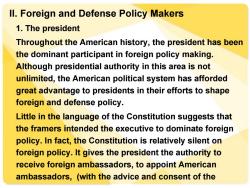
Il.Foreign and Defense Policy Makers 1.The president Throughout the American history,the president has been the dominant participant in foreign policy making. Although presidential authority in this area is not unlimited,the American political system has afforded great advantage to presidents in their efforts to shape foreign and defense policy. Little in the language of the Constitution suggests that the framers intended the executive to dominate foreign policy.In fact,the Constitution is relatively silent on foreign policy.It gives the president the authority to receive foreign ambassadors,to appoint American ambassadors,(with the advice and consent of the
II. Foreign and Defense Policy Makers 1. The president Throughout the American history, the president has been the dominant participant in foreign policy making. Although presidential authority in this area is not unlimited, the American political system has afforded great advantage to presidents in their efforts to shape foreign and defense policy. Little in the language of the Constitution suggests that the framers intended the executive to dominate foreign policy. In fact, the Constitution is relatively silent on foreign policy. It gives the president the authority to receive foreign ambassadors, to appoint American ambassadors, (with the advice and consent of the
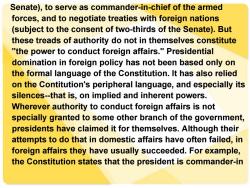
Senate),to serve as commander-in-chief of the armed forces,and to negotiate treaties with foreign nations (subject to the consent of two-thirds of the Senate).But these treads of authority do not in themselves constitute "the power to conduct foreign affairs."Presidential domination in foreign policy has not been based only on the formal language of the Constitution.It has also relied on the Contitution's peripheral language,and especially its silences--that is,on implied and inherent powers. Wherever authority to conduct foreign affairs is not specially granted to some other branch of the government, presidents have claimed it for themselves.Although their attempts to do that in domestic affairs have often failed,in foreign affairs they have usually succeeded.For example, the Constitution states that the president is commander-in
Senate), to serve as commander-in-chief of the armed forces, and to negotiate treaties with foreign nations (subject to the consent of two-thirds of the Senate). But these treads of authority do not in themselves constitute "the power to conduct foreign affairs." Presidential domination in foreign policy has not been based only on the formal language of the Constitution. It has also relied on the Contitution's peripheral language, and especially its silences--that is, on implied and inherent powers. Wherever authority to conduct foreign affairs is not specially granted to some other branch of the government, presidents have claimed it for themselves. Although their attempts to do that in domestic affairs have often failed, in foreign affairs they have usually succeeded. For example, the Constitution states that the president is commander-in
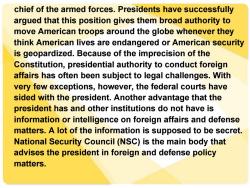
chief of the armed forces.Presidents have successfully argued that this position gives them broad authority to move American troops around the globe whenever they think American lives are endangered or American security is geopardized.Because of the imprecision of the Constitution,presidential authority to conduct foreign affairs has often been subject to legal challenges.With very few exceptions,however,the federal courts have sided with the president.Another advantage that the president has and other institutions do not have is information or intelligence on foreign affairs and defense matters.A lot of the information is supposed to be secret. National Security Council(NSC)is the main body that advises the president in foreign and defense policy matters
chief of the armed forces. Presidents have successfully argued that this position gives them broad authority to move American troops around the globe whenever they think American lives are endangered or American security is geopardized. Because of the imprecision of the Constitution, presidential authority to conduct foreign affairs has often been subject to legal challenges. With very few exceptions, however, the federal courts have sided with the president. Another advantage that the president has and other institutions do not have is information or intelligence on foreign affairs and defense matters. A lot of the information is supposed to be secret. National Security Council (NSC) is the main body that advises the president in foreign and defense policy matters
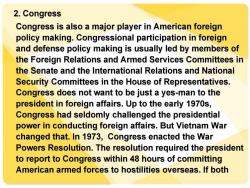
2.Congress Congress is also a major player in American foreign policy making.Congressional participation in foreign and defense policy making is usually led by members of the Foreign Relations and Armed Services Committees in the Senate and the International Relations and National Security Committees in the House of Representatives. Congress does not want to be just a yes-man to the president in foreign affairs.Up to the early 1970s, Congress had seldomly challenged the presidential power in conducting foreign affairs.But Vietnam War changed that.In 1973,Congress enacted the War Powers Resolution.The resolution required the president to report to Congress within 48 hours of committing American armed forces to hostilities overseas.If both
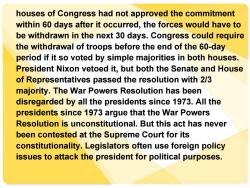
houses of Congress had not approved the commitment within 60 days after it occurred,the forces would have to be withdrawn in the next 30 days.Congress could require the withdrawal of troops before the end of the 60-day period if it so voted by simple majorities in both houses. President Nixon vetoed it,but both the Senate and House of Representatives passed the resolution with 2/3 majority.The War Powers Resolution has been disregarded by all the presidents since 1973.All the presidents since 1973 argue that the War Powers Resolution is unconstitutional.But this act has never been contested at the Supreme Court for its constitutionality.Legislators often use foreign policy issues to attack the president for political purposes
houses of Congress had not approved the commitment within 60 days after it occurred, the forces would have to be withdrawn in the next 30 days. Congress could require the withdrawal of troops before the end of the 60-day period if it so voted by simple majorities in both houses. President Nixon vetoed it, but both the Senate and House of Representatives passed the resolution with 2/3 majority. The War Powers Resolution has been disregarded by all the presidents since 1973. All the presidents since 1973 argue that the War Powers Resolution is unconstitutional. But this act has never been contested at the Supreme Court for its constitutionality. Legislators often use foreign policy issues to attack the president for political purposes
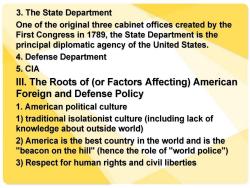
3.The State Department One of the original three cabinet offices created by the First Congress in 1789,the State Department is the principal diplomatic agency of the United States. 4.Defense Department 5.CIA Ill.The Roots of (or Factors Affecting)American Foreign and Defense Policy 1.American political culture 1)traditional isolationist culture (including lack of knowledge about outside world) 2)America is the best country in the world and is the "beacon on the hill"(hence the role of "world police") 3)Respect for human rights and civil liberties
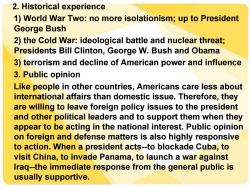
2.Historical experience 1)World War Two:no more isolationism;up to President George Bush 2)the Cold War:ideological battle and nuclear threat; Presidents Bill Clinton,George W.Bush and Obama 3)terrorism and decline of American power and influence 3.Public opinion Like people in other countries,Americans care less about international affairs than domestic issue.Therefore,they are willing to leave foreign policy issues to the president and other political leaders and to support them when they appear to be acting in the national interest.Public opinion on foreign and defense matters is also highly responsive to action.When a president acts--to blockade Cuba,to visit China,to invade Panama,to launch a war against Iraq--the immediate response from the general public is usually supportive
2. Historical experience 1) World War Two: no more isolationism; up to President George Bush 2) the Cold War: ideological battle and nuclear threat; Presidents Bill Clinton, George W. Bush and Obama 3) terrorism and decline of American power and influence 3. Public opinion Like people in other countries, Americans care less about international affairs than domestic issue. Therefore, they are willing to leave foreign policy issues to the president and other political leaders and to support them when they appear to be acting in the national interest. Public opinion on foreign and defense matters is also highly responsive to action. When a president acts--to blockade Cuba, to visit China, to invade Panama, to launch a war against Iraq--the immediate response from the general public is usually supportive
按次数下载不扣除下载券;
注册用户24小时内重复下载只扣除一次;
顺序:VIP每日次数-->可用次数-->下载券;
- 上海交通大学:《美国公共政策制定 Public Policy-making in the U.S.》课程教学资源(PPT课件)01 An Introduction(钟杨).ppt
- 上海交通大学:《美国公共政策制定 Public Policy-making in the U.S.》课程教学资源(讲义)Chapters 4, 16-20.pdf
- 上海交通大学:《美国公共政策制定 Public Policy-making in the U.S.》课程教学资源(讲义)Chapters 20-23.pdf
- 上海交通大学:《美国公共政策制定 Public Policy-making in the U.S.》课程教学资源(讲义)Chapter 7 EQUAL RIGHTS:STRUGGLING TOWARD EAIRNESS.pdf
- 上海交通大学:《美国公共政策制定 Public Policy-making in the U.S.》课程教学资源(讲义)Chapter 6 ECONOMIC RIGHTS AND OPPORTUNITIES:EXPRESSING INDIVIDUALISM.pdf
- 上海交通大学:《美国公共政策制定 Public Policy-making in the U.S.》课程教学资源(讲义)Chapter 5 CIVIL LIBERTIES:PROTECTING INDIVIDUAL RIGHTS.pdf
- 上海交通大学:《美国公共政策制定 Public Policy-making in the U.S.》课程教学资源(讲义)Chapter 3 LIMITED GOVERNMENT:PRESERVING LIBERTY.pdf
- 上海交通大学:《现代日本政治 Contemporary Japanese Politics》课程教学资源(课程讲义,共十章).doc
- 上海交通大学:《现代日本政治 Contemporary Japanese Politics》课程PPT教学课件(翟新,共九章).ppt
- 上海交通大学:《现代日本政治 Contemporary Japanese Politics》课程教学资源(参考资料)日華平和条約.pdf
- 上海交通大学:《现代日本政治 Contemporary Japanese Politics》课程教学资源(参考资料)日本自民党政权修宪的政治动向.pptx
- 上海交通大学:《现代日本政治 Contemporary Japanese Politics》课程教学资源(参考资料)日本政治史年表.pdf
- 上海交通大学:《现代日本政治 Contemporary Japanese Politics》课程教学资源(参考资料)日本政府关于历史问题正式见解.doc
- 上海交通大学:《现代日本政治 Contemporary Japanese Politics》课程教学资源(参考资料)日本国宪法.pdf
- 上海交通大学:《现代日本政治 Contemporary Japanese Politics》课程教学资源(参考资料)戰後日本的兩個中國政策與台灣觀.pdf
- 上海交通大学:《现代日本政治 Contemporary Japanese Politics》课程教学资源(参考资料)周鸿庆事件.pdf
- 上海交通大学:《现代日本政治 Contemporary Japanese Politics》课程教学资源(参考资料)人间宣言.docx
- 上海交通大学:《现代日本政治 Contemporary Japanese Politics》课程教学资源(参考资料)「第二次吉田書簡(1964年)」をめぐる日中台関係の展開.pdf
- 上海交通大学:《现代日本政治 Contemporary Japanese Politics》课程教学PPT课件(翟新,共九章).ppt
- 上海交通大学:《当代中国外交》课程教学资源_Lesson 8_中文阅读材料_三八线与十七虚线_朝战和越战期间中美信息沟通比较研究.pdf
- 上海交通大学:《美国公共政策制定 Public Policy-making in the U.S.》课程教学资源(PPT课件)11 U.S. Foreign Economic Policy Making.ppt
- 上海交通大学:《美国公共政策制定 Public Policy-making in the U.S.》课程教学资源(PPT课件)02 Cultural, Historical and Political Background of Public Policy-making in the U.S..ppt
- 上海交通大学:《美国公共政策制定 Public Policy-making in the U.S.》课程教学资源(PPT课件)03 Public Policy Contents.ppt
- 上海交通大学:《美国公共政策制定 Public Policy-making in the U.S.》课程教学资源(PPT课件)04 The Policy-Making Process.ppt
- 上海交通大学:《美国公共政策制定 Public Policy-making in the U.S.》课程教学资源(PPT课件)05 The Role of the Executive Branch in the Policy-Making Process.ppt
- 上海交通大学:《美国公共政策制定 Public Policy-making in the U.S.》课程教学资源(PPT课件)06 The Role of the Legislative Branch in the Policy-Making Process.ppt
- 上海交通大学:《美国公共政策制定 Public Policy-making in the U.S.》课程教学资源(PPT课件)07 The Role of the Judicial Branch in the Policy-Making Process.ppt
- 上海交通大学:《美国公共政策制定 Public Policy-making in the U.S.》课程教学资源(PPT课件)08 Political Parties, Campaigns and Elections in the U.S..ppt
- 上海交通大学:《美国公共政策制定 Public Policy-making in the U.S.》课程教学资源(PPT课件)09 Public Participation in the Policy-Making Process in the United States.ppt
- 上海交通大学:《美国公共政策制定 Public Policy-making in the U.S.》课程教学资源(讲义)CHAPTER 28 NATIONAL SECURITY POLICY.pdf
- 上海交通大学:《美国公共政策制定 Public Policy-making in the U.S.》课程教学资源(讲义)Chapters 24-25.pdf
- 上海交通大学:《美国公共政策制定 Public Policy-making in the U.S.》课程教学资源(讲义)Chapters 11-12.pdf
- 上海交通大学:《美国公共政策制定 Public Policy-making in the U.S.》课程教学资源(讲义)Chapters 13-15.pdf
- 上海交通大学:《美国公共政策制定 Public Policy-making in the U.S.》课程教学资源(作业展示)The U.S Government Shutdown of 2013.docx
- 上海交通大学:《美国公共政策制定 Public Policy-making in the U.S.》课程教学资源(作业展示)The Government Shutdown.doc
- 上海交通大学:《美国公共政策制定 Public Policy-making in the U.S.》课程教学资源(作业展示)American government shut down.doc
- 上海交通大学:《美国公共政策制定 Public Policy-making in the U.S.》课程教学资源(作业展示)My Understanding Of US Government Shutdown at 2013.docx
- 上海交通大学:《美国宪法与美国社会》课程教学资源_历史文献_艰难的一跃(美国宪法的诞生和我们的反思).pdf
- 山东大学法学院:必读之书——谈谈美国宪法理论经典(田雷).pdf
- 上海交通大学:《美国宪法与美国社会》课程教学资源_学术论文_电影《阿甘正传》与美国社会的价值回归.pdf
